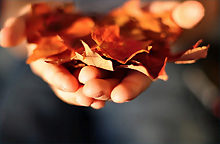I tell him he really shouldn't use the word should.
Yeah, the irony of that is not lost on me.
But, hey, neither is the sharp edge of his point: The week that a couple thousand people are washed away by walls of raging water — screaming toddlers with big eyes and wrinkled grandmothers who went without a word — maybe walking this earth like every step is a kiss of thanks is good theology.


Maybe watching the news and lingering on a face and being brave enough to let a calloused heart feel the ache of humanity again makes you press your heel differently into this soft earth.
Maybe kissing the earth with your footsteps is what wakes you to a touch of grateful passion again. Tell me that's vapid poetry. Somebody — somebody walking with a limp— might just tell you that it's your cynicism that's rabid stupidity. You could go ahead and laugh back. I'm only partially embarrassed to tell you that I almost laughed at the guy telling me how to walk too — except that prophets almost always get laughed at.
I thought I walked differently after Haiti. After Guatemala and Ecuador and Uganda. I thought the arch of my foot embraced the planet under me with this startling awareness of wild, unmerited grace. People had stood in the foyer after the Sunday sermon, sliding their kid's arms into jacket sleeves, asking me how the trip had gone and before I had groped for words to stuff impossible thing into, they had neatly concluded, "Sure makes you grateful, huh?"
I've said it myself. Looked at the footage of people in need, walked through dumps and kids looking for food amidst garbage and heard people say it: "You can't help but be grateful."
As if God uses slums and shanties and the starving merely as this cosmic Sunday School visual aid to make a bunch of the spoiled kids grateful. As if gratitude is this virtue that can neatly scrub away any inconveniencing responsibility, as if gratitude can quietly get us all off some uncomfortable hook.
Knee-jerk gratitude never changed how anyone walked. Knee-jerk gratitude just leaves your life cramped small.
In a world of need, it's too easy to think that static gratitude is our only responsibility — instead of feeling gratitude as the electric current empowering our ability to actually respond.
To actually do something. To actually walk, live, move, respond, go into this world as though our feet are kissing the grace of the ground under us and God over us, going as an embrace to those in need.
How do you grab every person getting off a plane from some short term mission trip, how do you write it over every thanksgiving table, how do you grab yourself in the mirror first thing? Gratitude isn't some neat Pollyanna period in a Life Mission Statement. Gratitude is the demanding question mark.

Gratitude is the demanding question mark in the grammar of your life — otherwise your life needs editing.
So you are grateful and... ?
So you are grateful and... ? What are you going to do?
So you are grateful and... ? How now will you live?
Thanksgiving that doesn't become thanksliving isn't thanksgiving. It's thanksdead. It's thanksnothing.
That band name — Grateful Dead? Don't let any record store tell you different — there's no such thing as the grateful dead. The Grateful can never live deadened, status quo lives.
The Grateful living know that Knee-Jerk gratitude cramps your life small — but Lifestyle Gratitude enlarges you to run the race of faith. Lifestyle Gratitude is about lives poured out — which makes you live larger and makes you live greater and makes you live more fully alive.
The Grateful are the great fuel of world change.
Eucharisteo — thanksgiving — always, always precedes the miracle.



I figure this is how I learn to walk, to put one foot in front of the other.
Who wants only a month of giving thanks for gifts, when you could have a life of being the gift; who wants only a holiday with a feast, when you could have a lifestyle that is a feast.
I just need a way to walk — a way to walk through a messy house and hormonal teenagers and these few short days before it's all over here and I'm skull and bones and whatever legacy I chose.
So I'm just fool enough to doggedly keep choosing the messiness of Eucharisteo, the gratitude with a question mark that demands an answer with my life and each line of eucharisteo, on a sign, on a card, supports mothers and babies in Haiti through Compassion, a Child Survival Program where women learn to read and write words.



And I look at the faces of these women, our sisters, our women, the very ones that this one line about eucharisteo, thanksgiving, is helping to change their lives, and I get how words can get into your veins and change your life.
Look into the eyes our mothers in Haiti who get food to keep their babies alive and learn how to nurture their small bodies and souls and minds, this Compassion center where mothers make and create to express and heal and feed their families. And I look into their eyes and get how that can get under your skin and change how you live, how you walk.
There are simple ways you can hang what you believe so you can give what you believe.
What if the question around holiday tables wasn't, "What are you so grateful for?" but rather, "How are you changing the world because you are so grateful?"
What if gratitude always meant a question mark — asking how will you let your gratitude to Christ mark the world for Christ?
I want to go find that guy I ran into, that prophet that no one's laughing at now, and tell him I'm getting that too — that a Thanksgiving that never moves into hands and feet and out into the world was never really Thanksgiving in the heart.
I want to tell him that yeah, sometimes we don't even know how to walk, let alone how to make every step like a grateful kissing the earth. I want to tell him about these severely autistic children I'd read about who couldn't even stand, let alone walk, and that there are a whole lot of us sort of like this.
Tell him how someone got the bright idea to slip a rope through all of these kids' hands together and help them to their feet — and together the kids could walk across the room. Together they could stand, together they could put one foot in front of the other.
The rope got thinner. Until it was invisible fishing line. But the kids got stronger. They kept gripping — together. They kept walking together.
Then someone got the idea to cut the fishing line into foot long lengths and hand these foot-long lengths to the kids. And they still walked. One steady foot in front of the other — nearly invisible foot-long lengths in their hands.
They figured out how to walk because they felt like they were holding on to one line, holding on to one line together.

A hundred times a day, I look at my little half-foot sign and figure out how to put one foot in front of the other and walk out into the world because thanksgiving is a verb — a way to walk, to respond, to give, to do, to change the world.
I want to tell that guy I ran into that I get it — that I get that Thanksgiving always moves into Christmas, because thanksgiving always moves out into the world as giving, that there are invisible threads holding us all together, that there are lines that we can hold on to, that hold us together.
That the way you walk, it could kiss more than the earth — it could kiss the Creator of the earth. It could kiss the kid across the table, the woman across town, the hurting mother across the world.

That there could be this walking together that holds us together, us all walking embraced.
Partnering with Dee at Red Letters, with 100% of all profits to support 50 mothers and their babies in need in Haiti through Compassion's Child Survival Program









Reader Comments
Archived Facebook Comments